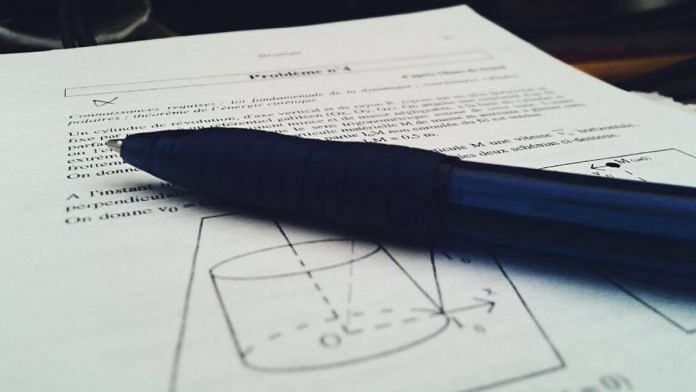New Delhi: The Central Board of Secondary Education (CBSE)’s decision to revise the syllabus for Classes 9-12 for the academic year 2020-21 has not only seen significant chapters drop from social science subjects but also core science subjects.
The revised Physics syllabus for Class 11 omitted portions from Newton’s Laws of Motion, Kepler’s law of planetary motion and the Doppler effect in waves, while chapters on anatomy and morphology of flowering plants were dropped from the Biology syllabus..
Science teachers have questioned the rationale behind these choices, and say this will not only affect a student’s understanding of key concepts but also impact them when they attempt entrance exams such as the Joint Entrance Examination (JEE) for engineering colleges and National Eligibility and Entrance Test (NEET) for medical colleges.
“Some of the topics that CBSE has deleted are very crucial, like anatomy and morphology of flowering plants from Class 11 Biology books. There are a lot of questions from that chapter in NEET. From Class 12 books, a chapter on environmental issues has been removed. That chapter was CBSE’s favourite for 5 mark-questions. Students could easily score marks from that chapter, so they are disappointed that the chapter has now been removed,” said Sindhu Vikram, a Biology teacher at Modern Public School, Shalimar Bagh Delhi.
The CBSE, however, has said teachers can instruct students on any of the omitted chapters if they felt it was necessary to connect to topics that were in syllabus.
Also read: CBSE reduces syllabus for classes 9 to 12 by 30% for academic year 2020-21
Missing in class
Class 11 students won’t have to study the Doppler effect either — the change in frequency of a wave in relation to an observer who is moving relative to the wave source. The science is used at airports to guide aircraft, and in the military to detect enemy aircraft. Astrophysicists use it to measure the velocities of stars, while doctors use it to study heart beats and blood flow in different parts of the body.
“Topics like Doppler’s effect are not just limited for students to cram up and pass entrance exams like JEE and NEET … these things have relevance when it comes to practical application as well. It is important to understand the concepts of astrophysics,” said Santosh Sharma, an educator and teacher trainer based in Madhya Pradesh.
“I really do not understand the reason why CBSE would remove such crucial topics from its books, even if it is for one year. If they want to reduce the syllabus, they should do it rationally, else why not make it a zero year?”
A zero year refers to when no classes are held.
Apart from Doppler effect, inertia and momentum, that are a part of Newton’s Laws of Motion and are usually taught in detail in Class 11, won’t be taught this year.
Other significant omissions include Kepler’s Law of planetary motion — three scientific laws describing the motion of planets around the Sun, published by Johannes Kepler between 1609 and 1619. These laws are very crucial to astronomy.
A significant portion of radioactivity — to do with alpha, beta and gamma particles/rays and their properties and the radioactive decay law — has been removed for Class 12.
“What is relevant with the syllabus reduction is if CBSE has kept in mind the pre-requisite, if in Class 10 they are deleting a chapter that is being taught in Class 11 then students are at a disadvantage. They will not know the basic concepts before beginning a new topic,” said Prof Dheeraj Sanghi, director, Punjab Engineer College.
“Apart from being crucial for entrance exams like NEET and JEE, some of the deleted portions in science books are also conceptual,” he added.
Also read: CBSE partners with Facebook to launch curriculum on digital safety & augmented reality
Chemistry takes several cuts too
Anant Prakash, assistant professor at Delhi University said, “Basics of atomic structure has been deleted from Class 11 Chemistry books. There are similar randomly deleted portions in books. On one hand, India talks about being a world leader in education and this is how they are downgrading the quality of education.”
In the Class 10 syllabus, basic science such as a chapter on chemical substances — metals and non-metals: basic metallurgical processes; corrosion and its prevention, carbon and its compounds — has been omitted.
Under carbon studies, nomenclature of carbon compounds containing functional groups (halogens, alcohol, ketones, aldehydes, alkanes and alkynes), and the difference between saturated hydrocarbons and unsaturated hydrocarbons have been removed.
From the chapter on Effects of Current, magnetic effects of electric current: electric generator, direct current; alternating current: frequency of AC; advantage of AC over DC; and domestic electric circuits have been dropped.
Also read: Marks for cancelled CBSE Class 12, 10 exams to be based on students’ best performing subjects
Revision currently limited to batch 2020-21
According to officials in CBSE, the syllabus revision is only limited to 2020-21 batch of students, and has been rationalised keeping in mind the Covid-19 situation.
“A committee of experts from NCERT had suggested the changes … these suggestions were discussed by the board and subject experts before being made public,” a senior official in CBSE said.
However, the board has asked teachers to teach the deleted topics to students if they deemed it fit and crucial for students, the official added.
Also read: StudentsLivesMatter trends as students outrage at UGC decision to hold final exams amid Covid




Metallurgy has been a trivial topic and they hardly ask a question on it in neet or jee but why would “theprint ” misquote new guidelines where magnetism and electricity are still in syllabus ,its better these guys get actual journalist .
Most of the topics listed above have little to not relevance in most people’s lives… Education must not be about passing an exam as it is now.
Please comment